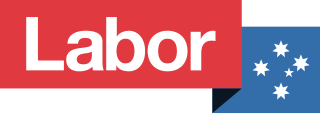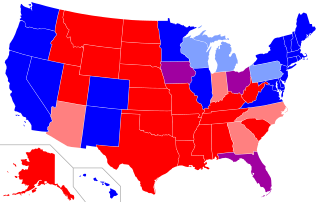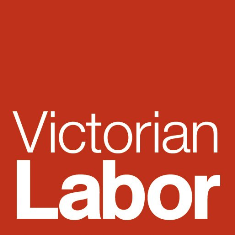Related Research Articles

The Australian Labor Party (ALP), also known simply as Labor or the Labor Party, is the major centre-left political party in Australia and one of two major parties in Australian politics, along with the centre-right Liberal Party of Australia. The party has been in government since the 2022 federal election, and with political branches active in all the Australian states and territories, they currently hold government in New South Wales, Queensland, South Australia, Victoria, Western Australia, and the Australian Capital Territory. As of 2024, Tasmania and Northern Territory are the only state or territory where Labor currently forms the opposition. It is the oldest continuous political party in Australian history, having been established on 8 May 1901 at Parliament House, Melbourne; the meeting place of the first Federal Parliament.
A coalition government, or coalition cabinet, is a government by political parties that enter into a power-sharing arrangement of the executive. Coalition governments usually occur when no single party has achieved an absolute majority after an election. A party not having majority is common under proportional representation, but not in nations with majoritarian electoral systems.

The Country Liberal Party of the Northern Territory (CLP), commonly known as the Country Liberals, is a centre-right and conservative political party in Australia's Northern Territory. In territory politics, it operates in a two-party system with the Australian Labor Party (ALP). It also contests federal elections as an affiliate of the Liberal Party of Australia and National Party of Australia, the two partners in the federal coalition.

An election is a formal group decision-making process by which a population chooses an individual or multiple individuals to hold public office.

Euroscepticism, also spelled as Euroskepticism or EU-scepticism, is a political position involving criticism of the European Union (EU) and European integration. It ranges from those who oppose some EU institutions and policies and seek reform, to those who oppose EU membership and see the EU as unreformable. The opposite of Euroscepticism is known as pro-Europeanism.
The Natural Law Party (NLP) is a transnational party founded in 1992 on "the principles of Transcendental Meditation", the laws of nature, and their application to all levels of government. At its peak, it was active in up to 74 countries; it continues in India and at the state level in the United States. The party defines "natural law" as the organizing intelligence which governs the natural universe. The Natural Law Party advocates using the Transcendental Meditation technique and the TM-Sidhi program as tools to enliven natural law and reduce or eliminate problems in society.
The National Party of Australia, commonly known as the Nationals or simply the Nats, is a centre-right and agrarian political party in Australia. Traditionally representing graziers, farmers, and rural voters generally, it began as the Australian Country Party in 1920 at a federal level.

A political party is an organization that coordinates candidates to compete in a particular country's elections. It is common for the members of a party to hold similar ideas about politics, and parties may promote specific ideological or policy goals.

Party primaries or primary elections are elections in which a political party selects a candidate for an upcoming general election. Depending on the country and administrative division, there may be an "open primary", in which all voters are eligible to participate, or a "closed primary", in which only members of a political party can vote.
In political science, a multi-party system is a political system where more than two meaningfully-distinct political parties regularly run for office and win elections. Multi-party systems tend to be more common in countries using proportional representation compared to those using winner-take-all elections, a result known as Duverger's law.

The Liberal–National Coalition, commonly known simply as the Coalition or the LNP, is an alliance of centre-right to right-wing political parties that forms one of the two major groupings in Australian federal politics. The two partners in the Coalition are the Liberal Party of Australia and the National Party of Australia. Its main opponent is the Australian Labor Party (ALP); the two forces are often regarded as operating in a two-party system. The Coalition was last in government from 2013 to 2022. The group is led by Peter Dutton, who succeeded Scott Morrison after the 2022 federal election.

Starting with the 2000 United States presidential election, the terms "red state" and "blue state" have referred to US states whose voters vote predominantly for one party—the Republican Party in red states and the Democratic Party in blue states—in presidential and other statewide elections. By contrast, states where the vote fluctuates between the Democratic and Republican candidates are known as "swing states" or "purple states". Examining patterns within states reveals that the reversal of the two parties' geographic bases has happened at the state level, but it is more complicated locally, with urban-rural divides associated with many of the largest changes.
In a governmental system, a party leader acts as the official representative of their political party, either to a legislature or to the electorate. Depending on the country, the individual colloquially referred to as the "leader" of a political party may officially be party chair, secretary, or the highest political office.
The Western Australian National Party, officially known as the National Party of Australia (WA) Inc, and branded as Nationals WA, is a political party in Western Australia. It is affiliated with the National Party of Australia, but maintains a separate structure and identity. Since the 2021 state election, the Nationals have been the senior party in an opposition alliance with the WA Liberal Party in the state parliament.

An electoral or voting system is a set of rules used to determine the results of an election. Electoral systems are used in politics to elect governments, while non-political elections may take place in business, non-profit organisations and informal organisations. These rules govern all aspects of the voting process: when elections occur, who is allowed to vote, who can stand as a candidate, how ballots are marked and cast, how the ballots are counted, how votes translate into the election outcome, limits on campaign spending, and other factors that can affect the result. Political electoral systems are defined by constitutions and electoral laws, are typically conducted by election commissions, and can use multiple types of elections for different offices.

The Victorian Labor Party, officially known as the Australian Labor Party and commonly referred to simply as Victorian Labor, is the Victorian state branch of the Australian Labor Party (ALP). Victorian Labor forms the incumbent government in the state of Victoria and is led by Jacinta Allan, who has served concurrently as Premier of Victoria since 2023.

The Western Australian Liberal Party, officially known as the Liberal Party of Australia (Western Australian Division), is the division of the Liberal Party of Australia in Western Australia. Founded in March 1949 as the Liberal and Country League of Western Australia (LCL), it simplified its name to the Liberal Party in 1968.
References
- ↑ "By-Elections 1951-1954". Psephos. Archived from the original on 16 March 2011.